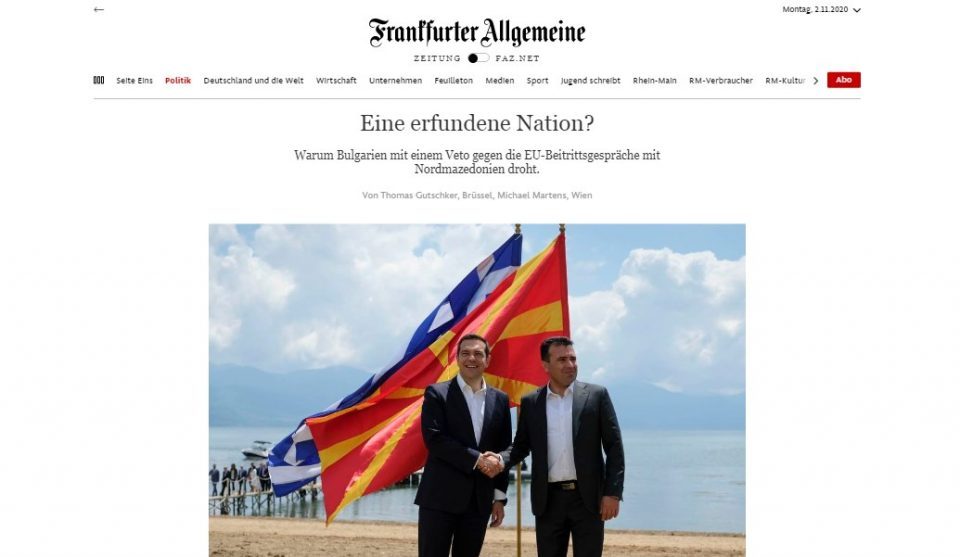frankfurter Allgemeine Zeitung reports on the growing threats from Bulgaria that it will block Macedonia from opening its EU accession talks. According to FAZ, Bulgarian Ambassador to Brussels Dimitar Cancev already treated his colleagues to two lengthy and emotional speeches, in which he detailed Bulgaria’s demands from Macedonia.
Sofia wants the Macedonians to acknowledge that they were Bulgarians and spoke the Bulgarian language before becoming an independent nation through a process of historic forgery. His comments were met with bemusement and lack of understanding from the other EU ambassadors and nobody joined the Bulgarian Ambassador, not even the Greeks, or the French and the Dutch who blocked the opening of accession talks with Macedonia and Albania a year ago, FAZ reports. Although, if there is one thing Macedonians learnt from the lengthy dispute with Greece, it’s that it only takes one country to block a candidate from opening accession talks, especially if no other country is willing to step up and support the candidate.
Bulgaria submitted a verbal and written note to the other countries. It demands that any mention of “North Macedonia” as a short name is scrapped because it could imply Macedonian territorial claims to the Bulgarian region of Pirin Macedonia. Even more worryingly, Bulgaria wants to have the use of the term Macedonian language banned in the EU and insists that the language is referred to as the “official language in accordance with the Constitution of the Republic of North Macedonia”.
Bulgaria claims that a Bulgarian dialect was spoken in Macedonia, but Belgrade pushed to wipe out the Bulgarian character of the Macedonians between 1918 and 1991, initially trying to persuade them that they are “southern Serbs” and later – an independent nation, FAZ writes, also reporting the Bulgarian claim that the Yugoslav communist regime killed or expelled over 100,000 Bulgarians from the Republic of Macedonia over the decades.
FAZ reports that some of the ambassadors asked why Bulgaria did not raise these issues while the Prespa treaty was being imposed on Macedonia – to resolve similar historic disputes raised by Greece. But even before Prespa, Bulgaria had Macedonia sign the Zaev – Borisov treaty in 2017, which paves the way for the claims Bulgarian authorities are now making.
Macedonia is relying on two German social-democratic politicians close to the Zaev regime, Foreign Minister Heiko Maas and his assistant Michael Roth to try and pressure Bulgaria. FAZ writes that Maas and Roth are in constant communication with both capitals and are pushing on Bulgaria to relent so that the accession talks could open before the year’s end – while Germany holds the presidency of the European Council. One possible solution, FAZ reports, is to refer to the Macedonian language as the “appropriate official language”, although this is nothing more than accepting Bulgarian demands. “There are considerations here that are taken seriously in Brussels, namely that we can’t have countries tell other countries how to call their language. In (North) Macedonia, they believe that Bulgaria is drawing inspiration from Athens, after Greece was able to make gains using pressure, and now the Bulgarians want to do the same”. FAZ reports.
Macedonia could also be pressured into making additional statements that it does not have any territorial claims toward Bulgaria – like it did with regard to Greece.
All six Western Balkan countries are growing concerned as they observe the Bulgarian approach. If other EU member states also try to impose their views on the candidate countries, enlargement would become impossible, FAZ writes.





Comments are closed for this post.